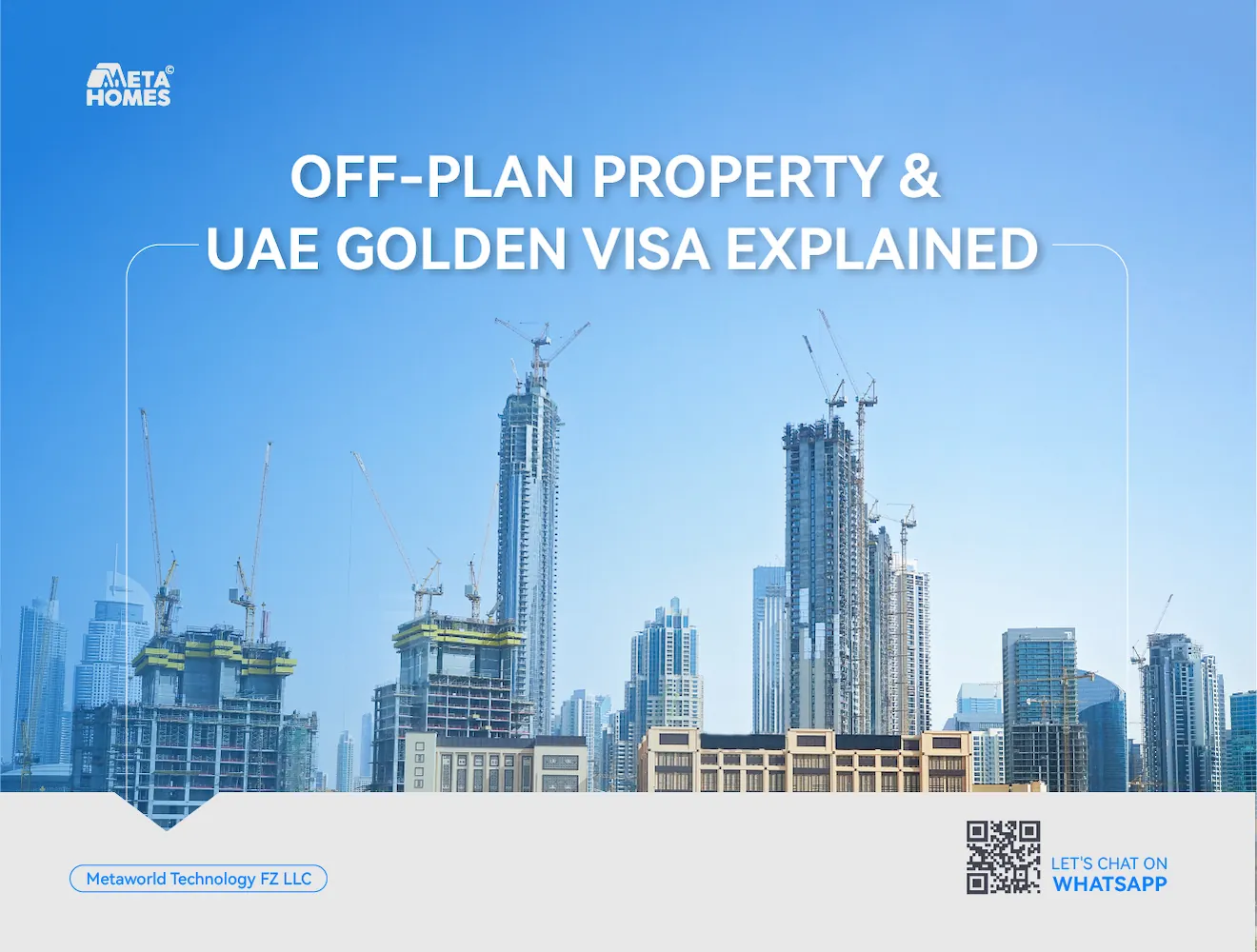
Investing in property and securing long-term residency might sound like two separate decisions, but in the UAE today, they’re often very much connected.
If you’re looking at acquiring an off-plan property in the UAE, you’re stepping into a market that offers early-stage value and newer home designs.
At the same time, the UAE Golden Visa presents a pathway to live, work and stay in the country for an extended period, beyond the usual short-term residency permits.
Understanding both together is important because many buyers now ask: “What does off-plan property mean?”, “Can my property purchase support a Golden Visa application?”, or “What are the real requirements and benefits of the Golden Visa in the UAE?” This will be our topic of discussion in this blog.
When you invest in an off-plan project, you usually get lower prices, earlier payment terms, and the chance to choose a unit that will meet your future needs.
The Golden Visa, on the other hand, offers stability, allowing you to live in the UAE for 5 or 10 years (with the option to renew) if you meet specific requirements. (U.AE)
Off-Plan Property in the UAE
When you hear the phrase “off-plan property,” it means buying a property before it is finished, either while it is being built or even before it starts. That is to say, you agree to purchase the building before it is completed or ready for occupancy.
Buying off plan property in Dubai and other parts of the UAE lets you see prices and payment plans that are earlier in the process and often more flexible than for a property that is ready to move into.
In Dubai and other parts of the UAE, buying off-plan property gives you access to earlier-stage pricing and payment plans that are often more flexible than for a ready-to-move-in property.
Benefits of Buying Off-Plan Property in UAE
There are many benefits to buying off-plan property, especially if you want to invest or plan ahead for your own home. Here are some benefits of buying off plan properties in UAE:
- Lower entry cost: Many developers, if not all of them, often offer lower prices for off-plan properties compared to secondary properties, which allows investors to maximize profits, because the value of the finished property will increase significantly.
- Flexible Payment plans: Many off-plan projects let you pay in installments over time, like during the construction process and after handover. Many developers in UAE offer payment on 10/60/30 payment terms. This means that investors can pay 10% as a down payment, which forms the legal binding that they have secured the property, then 60% during the entire construction process, which can last for even 3 years, depending on the developer’s timeline, and 30% after the project is completed.
- Possible capital appreciation: As the project gets closer to being finished and the infrastructure around it is built, off-plan units may become more valuable. If you buy early, your investment may grow before you even move in.
- New construction and modern finishes: New projects usually have modern layouts, up-to-date amenities, and brand-new construction, which means fewer maintenance problems at first.
- Many options to choose from: When you buy off-plan property, you can choose from different units (floor level, view, etc.) because you can pick before the inventory is sold out.
Risks and Considerations While Buying Off-Plan Property
Although off-plan properties are a very good investment option in the UAE, there are also risks involved.
-
Delays or cancellations of the project: Construction may take longer than planned, or in the worst case, the project may be canceled or greatly delayed, and your investments might be affected negatively.
- Changes in the market: The property market could change between the time you buy and the time you get it. The value you thought you would get may be lower if demand falls.
- Uncertainty about quality: Off-plan simply means that the structures have not been built yet, and so, what you are dealing with are mere prototypes and not the finished property itself. The finishes, materials, views, or landscaping may not match the original plans, which can be frustrating.
- Developer risk: The developer’s reputation and financial stability are very important things to consider when buying off-plan property in UAE.
- Payment obligations and exit restrictions: Some off-plan contracts may require you to make payments on a strict schedule, and you may not be able to sell the unit until certain criteria are met. It is important to prepare for all of these before even venturing into it.
How the Process of Buying Off-plan Properties in UAE Works
- Choose the project and developer: Look into the location, the developer’s past work, the design, the amenities, and the payment plan.
- Reserve the Unit with a Down Payment: To secure the unit so that no one buys it again, you need to pay a deposit, usually 10 to 20% of the property value.
- Sign the Sale and Purchase Agreement (SPA): This makes you legally responsible for the purchase and lays out the payment plan, the date of handover, penalties, exit conditions (in case you no longer want to buy the property), among many other legal bindings.
- Register your booking: In Dubai, your off-plan purchase will be registered in systems like Oqood through the Dubai Land Department (DLD) which protects your transaction.
- Follow Up with Payments throughout construction stages: With many developers, you are obligated to pay according to agreed milestones (e.g., foundation, structure, finishing and handover).
- Handover and registration: When the building is completed, you inspect the unit, settle final payments, and register the title deed. When all these criteria are met, you become the rightful and legal owner of the property.
- Rent or occupy: Once you’re ready, you can move in or rent the unit. Some choose to wait for completion to lease it or use it.
UAE Golden Visa Explained (What It Is & Benefits)
The UAE Golden Visa is a long-term residence permit that the United Arab Emirates created so that eligible foreign nationals can live, work, and study in the country for a long time, usually 10 years, and it can be renewed.
There are many important benefits to having a Golden Visa. Some outstanding benefits of the UAE golden visa include:
- Long-term, renewable residency: You can live in the UAE for up to 10 years (or 5 in some cases) and then renew your residency.
- No need for a local employer sponsor: A lot of traditional work visas require a UAE employer sponsor, but the Golden Visa does not.
- Family sponsorship: The visa usually lets you sponsor your spouse and kids under the same status.
- Freedom to do business and invest: Golden visa holders can start and run businesses in the UAE, buy property or other assets, and take advantage of the UAE’s business-friendly environment.
- Access to good schools and hospitals: If you are a UAE golden visa holder, you will have unrestricted access to UAE’s international-standard schools, universities, clinics, and hospitals without any restrictions.
- Strong global travel and mobility support: The UAE has great travel and connectivity infrastructure, and the Golden Visa status makes you even more flexible than the normal two-year work visa.
UAE Golden Visa Requirements for Off-Plan Property Buyers in UAE
One of the most common ways of getting the UAE Golden Visa these days is by investing in real estate.
If you invest in real estate in the UAE and meet certain requirements (a property equivalent to or more than AED 2 million), the government will give you residency as a sign of your long-term commitment to the country.
Below is a clear, straightforward breakdown of the current requirements.
Key Eligibility Criteria for UAE Golden Visa
You may be eligible to apply for the Golden Visa UAE if your real estate investment meets these conditions:
Requirement What It Means
Minimum investment value: AED 2 million Property value must be AED 2M or more (single or combined).
Eligible property types: Ready or off plan. Off-plan properties must be from approved developers in the UAE.
Mortgage-financed properties: Allowed But the minimum AED 2M must be paid to qualify, and the mortgage must be from an approved UAE lender.
Ownership status: Full or joint ownership Joint investors must have a share worth AED 2M individually to qualify.
Proof of ownership: Valid title deed or Oqood Oqood is typically used for off-plan property registration in Dubai.
How to Apply for UAE Golden Visa through Buying Off-Plan Property
If you’re planning to use an off-plan property investment as a route to the UAE Golden Visa, it helps to understand exactly how the application process works.
Identify an Off-Plan Property That Qualifies
- Search for an off-plan project by a reputable developer in approved freehold or investment zones in Dubai.
- Make sure the investment value meets the minimum required threshold of AED 2 million for the 10-year Golden Visa via real estate (off-plan or ready) in Dubai and the UAE.
- Check that the project meets any completion-stage conditions (some off-plan projects qualify once they are 50% complete).
- Verify the payment plan, legal contract (Sale & Purchase Agreement or SPA), and how your investment will be registered (e.g., Oqood in Dubai).
Secure the Purchase & Documentation
- Sign the SPA or reservation contract with the developer. Ensure the investment amount, payment schedule and hand-over details are clearly stated.
- Pay the required deposit or initial instalments, according to the developer’s payment plan.
- For off-plan property, compile payment receipts, developer confirmation of unit value, and any bank NOC if it’s financed or mortgaged.
- After payments progress and registration is processed, obtain the official registration certificate (for example the Oqood in Dubai) or title deed when relevant. (Dubai Land Department)
Check Eligibility & Prepare the Golden Visa Application
- Confirm that the value of your investment meets the AED 2 million threshold (or whatever the latest threshold is) and complies with other requirements (clean record, no serious health issues, etc.).
- Prepare supporting documents: passport copy, photo, property documentation (SPA, Oqood or title deed), bank NOC if applicable, proof of payment(s), and any required Emirates ID/residence copy for existing UAE residents.
- If you’re applying via Dubai, submit via the official portal of the Dubai Land Department (DLD) under the investor Golden Visa category.
Submit Application & Undergo Checks
- Submit your application and attach all supporting documentation as required by the DLD or the relevant Emirate’s authority.
- You may be required to undergo a medical fitness test and security/character check (as for other long-term residencies).
- Wait for initial approval. Once you receive it, you can move to the residency steps (emirates ID, visa stamping, etc.).
Visa Stamping & Emirates ID
- After approval, the visa is stamped into your passport (or you receive the residence permission), and you will apply for your Emirates ID.
- If you plan to sponsor family members (spouse, children), ensure their documents (birth certificates, marriage certificate, health insurance) are ready.
- Once stamped, you hold a long-term visa (10 years for the standard real-estate route) that gives you the freedom to live, work and study in the UAE.
Maintain Your Investment & Visa Conditions
- Keep your property investment active. Some freehold zones require you to maintain ownership for a certain period.
- Hold valid health insurance, ensure your residence is current, and stay in compliance with any visa-holding requirements.
- For many Golden Visa holders, there is no minimum stay requirement in the UAE each year, but you should always verify current rules.
- If you sold the property, check how it affects your visa status and whether you must notify authorities or reinvest.
Post-Application: Family Sponsorship & Additional Benefits
- With the visa stamped, you can typically sponsor your spouse and children under the same long-term residency status.
- Explore business or investment opportunities using your visa status (opening a company, investing further).
- Enjoy quality-of-life benefits in the UAE: international schooling, healthcare, travel freedom and lifestyle options.
What exactly is an off-plan property in the UAE?
An off-plan property refers to real estate units that are purchased before construction has been completed, often when the developer is still building the structure or has just started construction.
You buy the unit by reserving it, paying instalments while it’s under development, and then taking handover when it’s finished. The key is that you’re investing early.
Can off-plan property qualify for the UAE Golden Visa?
Yes, in many cases. In Dubai, for example, off-plan properties are now eligible for the 10-year Golden Visa via the real-estate route, provided they meet the criteria (such as minimum value, freehold zone, registration in your name) and you provide proper documentation. That means even though the property is not yet fully handed over, if the developer has registered the unit (for example via Oqood) and you meet payment/value thresholds, you can apply.
What is the minimum property investment required for the Golden Visa real estate route?
As of the latest publicly available guidance, the minimum investment for the real-estate route in Dubai (and wider UAE) is about AED 2 million or more, registered under your name. Off-plan or completed properties can qualify under this threshold if all conditions are met.
Do I need to live in the property or maintain a minimum stay in the UAE to keep the Golden Visa?
No, the Golden Visa does not strictly require a minimum stay or residency period in the UAE each year; holders can live abroad for periods without automatically invalidating the visa. However, staying abreast of specific Emirate rules is wise, as compliance includes maintaining the qualifying investment or status.
Are mortgaged properties eligible for a Golden Visa?
Yes, mortgages are allowed, but the equity you hold (or amount paid) must meet the qualifying value. Some authorities require that the investment is not be entirely loan-financed.
What documents do I need for the Golden Visa under property investment?
Standard documents include: passport copy, photo, proof of residence if in the UAE, property title deed or registration certificate (e.g., Oqood), bank statements or payment receipts, verification of value by land department, clear criminal record.
What are the benefits of holding the UAE Golden Visa?
- Long-term residency (10 years) is renewable
- No local employer sponsor required
- Ability to sponsor spouses and children under the same status
- Access to UAE education, healthcare, business environment, and lifestyle benefits
If I sell the property, will I lose the Golden Visa?
Potentially. Since the visa is granted based on your qualifying investment, selling the property may trigger a review of your eligibility. It’s advisable to confirm with immigration or land department authorities if you plan to sell, or transfer the investment to another qualifying one.



Leave a Reply